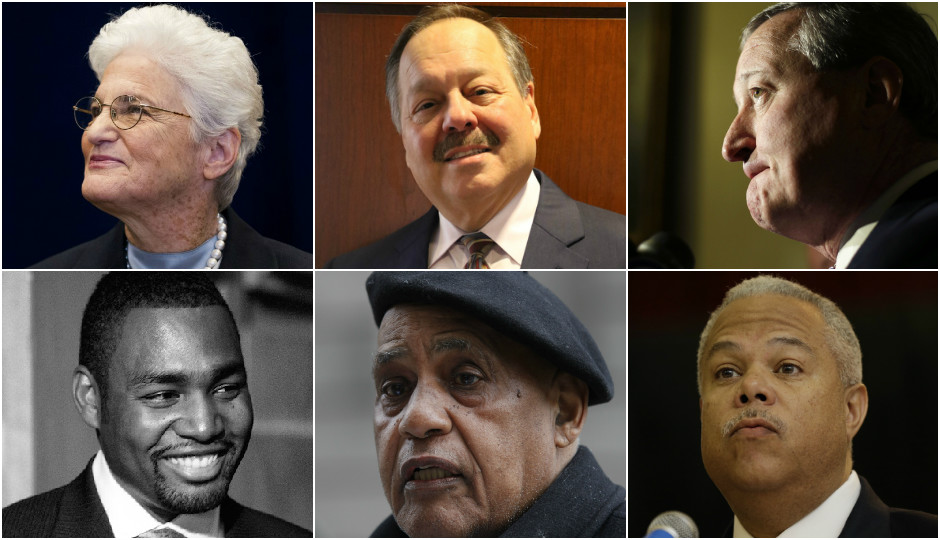Negadelphia Is No More — Can the Mayoral Candidates Adapt?

The headline news from The Pew Charitable Trusts poll last week was clear: residents are feeling pretty damn good about the city, even if there are actually lots of reasons to worry (more on that a little later today).
What does that mean for the mayoral race? And are there other political lessons to be learned from Pew’s poll (full disclosure: I’ve done some work for the Pew Philadelphia Research Initiative, which conducted the poll)?
1. Philadelphians are, for now at least, an optimistic, forward looking bunch. Can the candidates craft a message that appeals to that Zeitgeist? What might that look like?
Pew found that 67 percent of Philadelphians expect the city to improve over the next five years. Only a tiny minority, 18 percent, predict decline. Right now, there’s not a lot of Nega in Philadelphia.
That complicates the political landscape for the mayoral contenders more than you might think. Campaigns typically take one of two broad directions: Change, or Stay the Course. Mayor Nutter won his 2007 campaign by running against John Street. It didn’t particularly matter that Street wasn’t eligible for a third term. The city was ready for a change and Nutter drew the sharpest contrast of all the contenders between himself and Street.
That strategy plainly won’t work this cycle. Nutter is simply too popular. You see that fact reflected in Jim Kenney’s stabs at public rapprochement with the mayor, after feuding with him for years.
But it’s tough for any of the candidates to compellingly make the Stay-the-Course argument because none of them can plausibly claim they are Nutter’s heir (Doug Oliver may benefit some from his stint as Nutter’s press secretary, but that was a while ago now). There’s no Al Gore or George H.W. Bush in the field. The city’s optimism could be good news for a fresh-faced candidate, someone evocative of that optimism who can sell him or herself as the leader of Philadelphia’s bright new future. But that’s hardly a strength of this mayoral field, with again, the possible exception of Oliver.
Divisive, hard-nosed campaigning could backfire for the candidates, given the city’s good mood. What sort of messaging might register with voters now? One would think that a candidate who can articulate a clear, exciting vision for the city’s future, would stand a better chance in this environment than a dour, the-city-is-going-to-hell-and-only-I-can-save-it approach.
2.The poll is more vindication for Michael Nutter.
Partly it’s the mayoral race, which features candidates that Nutter could probably run rings around. Partly it’s his record. And partly it’s a general halo effect: Nutter is benefitting from Philadelphians good mood about the city. They seem increasingly willing to give Nutter some credit for the city’s overall direction. His new 52 percent approval rating is a whopping 13 point improvement over his number in 2013. It seems increasingly certain that Philadelphians will miss Michael Nutter when he’s gone.
3. City Council’s report card was pretty solid, especially on the PGW deal. That’s good news for Council incumbents, and Jim Kenney too.
More Philadelphians disapprove of City Council than approve of it, but not many (42 percent to 40 percent). That’s a marked improvement over Pew’s poll in 2013, when 30 percent approved of Council and a whopping 57 percent disapproved. Still more notable, however, is Pew’s finding that (of those Philadelphians with an opinion) opposition to selling off PGW is strong. Just 17 percent of respondents approved of selling the utility, compared to 38 percent who disapproved. A large number of Philadelphians, 45 percent, had no opinion on the sale.
Compare those findings with elite commentary on the sale—including plenty on Phillymag.com—which has leaned strongly in favor of selling off the utility. Council members can’t afford politically to listen exclusively to editorial boards, and plenty of them said frequently during the debate over PGW that their constituents were strongly against a sale. Now there’s polling data to back those claims up.
Politically this is obviously good news for Council incumbents. If there’s no widespread disgust with Council, then it’s less likely incumbents will lose their jobs. It’s also good news for Jim Kenney, a former veteran Councilman who didn’t object publicly when Council killed the PGW deal. The polling data suggests that decision didn’t irritate too many voters.
4. Property tax hikes may not be quite as politically toxic as many assume.
Remember the Actual Value Initiative? The massive, citywide reassessment of all properties using a new valuation methodology? Most Philadelphians don’t. Pew found that 60 percent of Philadelphians it surveyed were unfamiliar with AVI. Among the minority that was familiar with AVI, 30 percent said the new approach was more fair, 36 percent said it was less fair (the new valuations are indisputably far more accurate than the old ones). Philadelphians were split on the 10-year property tax abatement too, with roughly a third wanting it to continue as-is, nearly a third wanting to see it reduced, and the final 30 percent favoring the program’s elimination.
Mayor Nutter has asked Council to raise property taxes to increase funding for public schools. It’s early yet, but it looks like Council may balk at that. But there’s nothing in the results from the Pew poll that suggests Philadelphians are on the verge of a property tax revolt. AVI was a traumatic and expensive transition, yes, but only for a relatively small slice of property owners. Council may want to remember that before completely closing off one of the few viable school funding options available (same for the mayoral candidates, whom have all already said they wouldn’t raise real estate taxes to fund schools).
5. Philadelphians heartily approve of Jim Kenney’s decriminalization of marijuana.
A whopping 64 percent of Philadelphians endorsed last year’s decriminalization of weed, which was spearheaded by Jim Kenney. It’s hard to tell if it’s a voting issue for many Philadelphians, but Kenney’s ownership of decriminalization certainly helps him some.